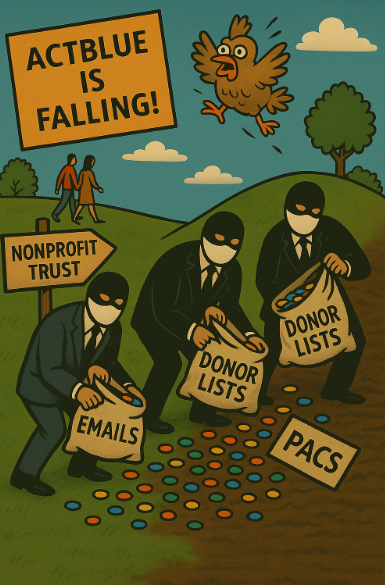Silicon Valley, ActBlue, and the Great Unraveling
If irony were rocket fuel, we could launch the James Webb Space Telescope into the next galaxy—or ship Elon Musk to his beloved Mars.
How else to explain the spectacle of Silicon Valley billionaires—men, yes, men– whose fortunes were built on science, data, and publicly funded research—now gleefully backing a political regime waging war on those very foundations?
Journalist Derek Thompson recently laid bare on The Bulwark how Trump and the MAGA machine are gutting the NIH and the NSF—slashing cancer research, sabotaging the Women’s Health Initiative, and trying to torch the very labs that developed the mRNA breakthroughs and Alzheimer’s drugs that will save their aging parents and probably their own aging asses, not just yours.
You’d think the tech elite might cry foul. But no. They’ve turned away from the scientific infrastructure that built their fortunes in favor of Trump’s performative grievance politics and tax cuts, a rage-fueled self-immolation dressed up as populism.
Sound familiar?
In our own house—especially the digital fundraising room—we’ve got our own crisis of misused tools. And we’re misdiagnosing the cause.
 Over at The Connector substack Michael Sifry’s sharp dissection of the ActBlue panic reminds us: the platform isn’t the problem. The sky isn’t falling. The problem is how it’s been used—and abused. .
Over at The Connector substack Michael Sifry’s sharp dissection of the ActBlue panic reminds us: the platform isn’t the problem. The sky isn’t falling. The problem is how it’s been used—and abused. .
While Trump weaponizes the DOJ to investigate ActBlue for phantom crimes—while ignoring the Republicans’ equaivalent WinRed’s actual, documented donor fraud—Democratic consultants and PACs are sending apocalyptic emails claiming ActBlue is about to be shut down. That’s not solidarity. That’s spam. It’s a cash grab disguised as crisis.
Worse, the very firms Sifry identifies as exploiting donor panic—Mothership Strategies, Message Digital, Sapphire Strategies—have raked in tens of millions using aggressive list rentals, dark patterns, and emotional manipulation that borders on predation.
Despite outcries against these predatory practices by scores of campaigns, nonprofits and ethical consultants, Democratic leaders like Rep. Pramila Jayapal, Rep. Adriano Espaillat, and others are still clients. The pols and pundits talk a lot about Democratic infrastructure—well, infrastructure that leaks donor trust like a sieve won’t last long.
Here’s the parallel I see: just as the tech world turned against science, the fundraising world risks turning against its own best ally—trust.
These tools—one-click payment platforms like ActBlue, email, SMS—aren’t magic. They work because donors learned to trust them. Because they were easy, frictionless, and felt like extensions of real movements. But as far too many fundraisers and their consultants chase short-term revenue over long-term relationships, that trust is fraying.
In his piece Micha Sifry reminds us: this is not an existential threat. It’s a cautionary tale.
Instead of panic over Act Blue or whatever platfrom Trump and his MAGA minions choose to attack, we need better practices involving donors. Instead of shrieking about the sky falling, we should be cleaning up our own yard. That means:
- Naming and shaming the spammy vendors.
- Calling on party leaders to drop abusive consultants.
- Diversifying platforms—not abandoning ActBlue, but ending our unhealthy dependency on a single button. Afterall, there are plenty of good alternative payment platforms.
- Investing in donor education, not exploitation.
Just as science doesn’t die when you defund it—it just moves elsewhere—small donor energy won’t vanish if ActBlue is hammered by Trump. But that energy and trust will erode if we keep treating donors like ATMs.
There’s a difference between playing hard and playing dirty. And there’s a cost to forgetting what got us here. A quiet cost. One you don’t see until it’s already settled around you like dust. We are at risk of becoming the thing we claim to fight: extractive, dishonest, transactional.
Let’s not be the Silicon Valley Bros of fundraising—turning our backs on the very values that built our movements in the first place.
Roger


